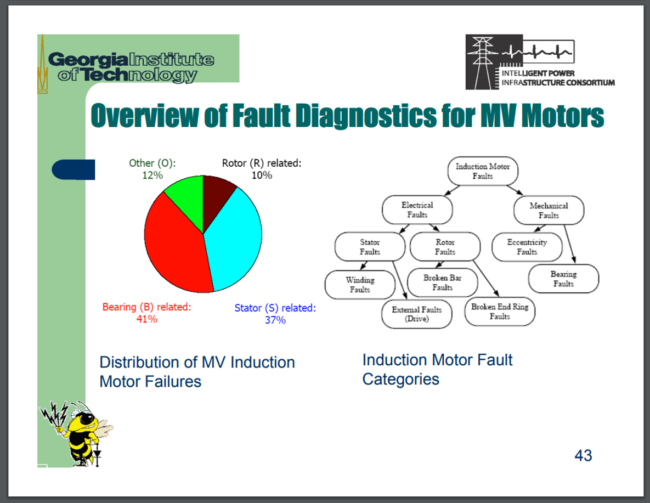The presentation "Medium Voltage Induction Motor Protection and Diagnostics," published online by the Georgia Institute of Technology in Atlanta is worth the time it takes to study it in detail!
The presentation authored by Yi Du, Pinjia Zhang, and Prof. Thomas G. Habetler from the School of Electrical and Computer Engineering.
This excellent and highly detailed presentation discusses:
- Heat transfer inside motors
- Thermal model-based approaches
- Parameter model-based approaches
- Other approaches
An area of my interest was in the last section of the presentation starting on slide 43 "Overview of Fault Diagnostics for MV Motors" In this slide the authors attributed 41% of medium voltage motor failures to bearing failures, listing among other causes "electrical stress."
 Slide 43 of Du, Zhang, and Habetler's presentation
Slide 43 of Du, Zhang, and Habetler's presentationThere is also an informative flow chart of induction motor fault categories.
Later, on slide 47, the authors include the following statement: "bearing failure is the most common fault for medium voltage motors," and list the following reasons:
- Reasons for Bearing Failure
- Electrical Stress:
- Stator, rotor or input voltage unbalance causes unbalanced magnetic flux, which induces shaft current, and the potential voltage between bearing and ground.
- Mechanical Stress:
- Friction and rotor eccentricity can cause mechanical failure of bearings.
- Thermal Stress:
- Overheat causes the failure of lubricant, which leads to friction.
- Electrical Stress:
Protecting MV motor bearings and when possible preventing failure modes would directly contribute to improving uptime and reliability, and ultimately save money - which was the subject of my blog post "Why protect medium voltage motors from bearing currents? It saves money!"
Enjoy the read!

